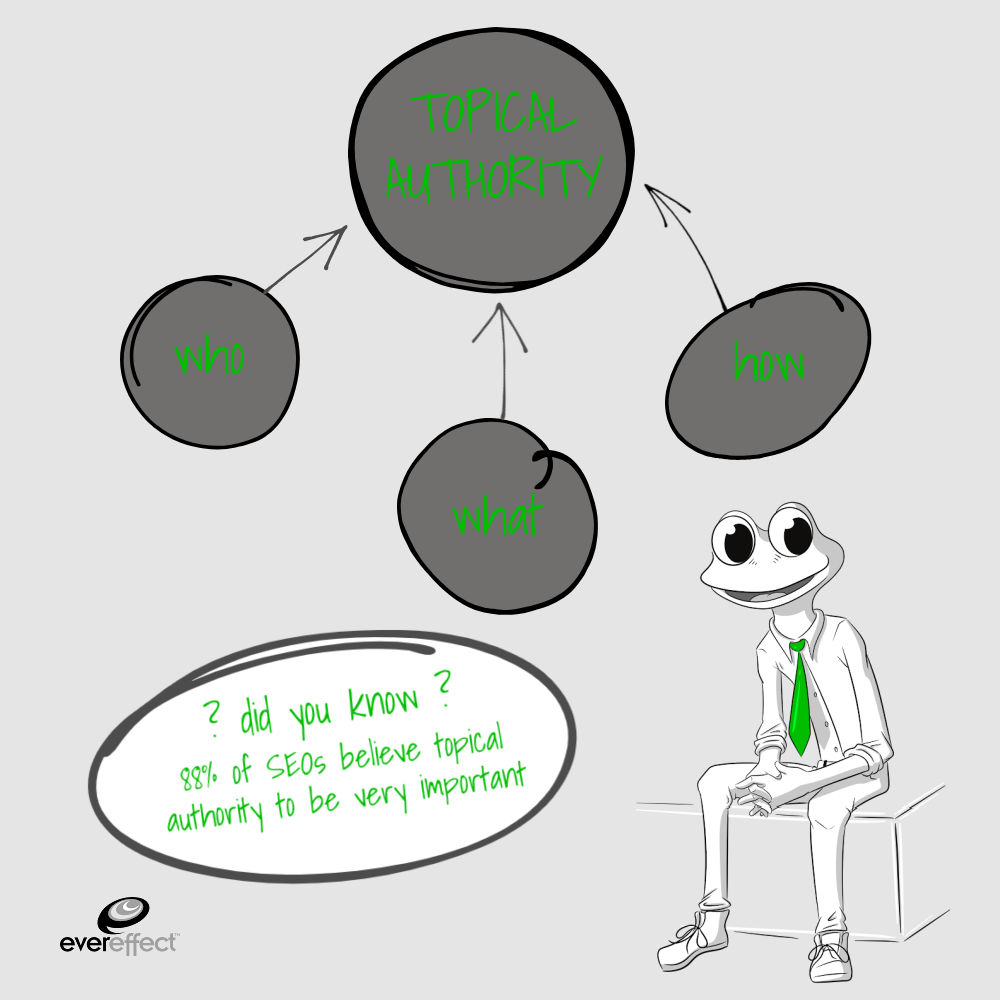What is Topical Authority? The Best Strategy to Build it!
To rank higher in SERPs (Search Engine Results Pages), you should get a high overall domain rating (DR) and topical authority. This concept is crucial in establishing your brand presence and expertise in a chosen field. If you’re a marketer, e-commerce owner, copywriter, or SEO specialist – read our article and learn what topical authority is and how to build it! We’ll also describe how to measure your website’s topical authority!
What is Topical Authority?
Topical authority is your website’s expertise for topics from a specific niche. For instance, you work in the natural cosmetics industry. To build topical authority, you should create a content distribution strategy around relevant keywords and subjects that refer to your niche, a.o.:
- “Why natural beauty?”
- “Benefits of natural cosmetics”
- “What is natural cosmetic products?”
- “Does natural cosmetics really work?”
We found these ideas in Ubersuggest – a popular keyword research tool.
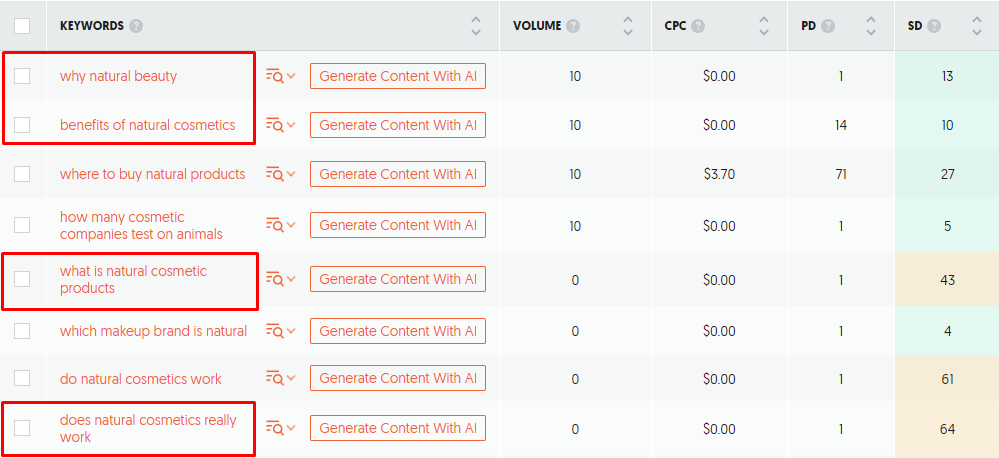
Topical authority topics from Ubersuggest.
The more content you prepare in your favorite niche, the more topical authority you’ll get.
You may think, “It’s straightforward! I can create any website, choose a profitable niche, write articles for any keywords related to my industry, and beat all competitors”. Not completely. Before you take the plunge, look at how topical authority works.
P.S. Don’t be discouraged if the keywords you searched for have zero searches. Keywords that have zero searches are actually explored. Usually, no more than a dozen times monthly, but they do happen. Check out Zero Volume Keywords – the Ahrefs’ guide to read more.
How Topical Authority Works?
To be honest, none of us know precisely how topical authority works. Google never issued an official statement. However, many digital marketing experts tested the impact of given activities on a website’s topical authority, and we have essential conclusions: content quality isn’t the only crucial factor!
You also should pay attention to link-building. Without this, even hundreds of articles won’t work because you need to prove authoritativeness for Google.
Want to skyrocket your site’s topical authority?
- Choose relevant topics with high-traffic potential if you have a robust website. If you’re just starting, dominate your niche using low-competition keywords with the most search volume;
- Provide the best content on your niche. It’s fundamental to add a unique value and expert point of view. Stand out from competitors. Remember about search intent;
- Add internal links to your content. You’ll make it easier for Google robots to scan your website and for users to navigate;
- Get natural backlinks from quality websites. Without link building, any SEO strategy won’t work.
Boosting topical authority will be challenging, but you’ll thank yourself for it in the future. If you want to effectively build topical authority and write authoritative content meeting search engines’ and users’ expectations, look below!
How to Build Topical Authority? – The Best Strategy!
Our strategy that helps you build topical authority:
Choose topically related keywords
After you find your favorite niche, choose relevant keywords using, e.g., Ahrefs, MOZ, SEMRush, or any other keyword research tool. We use Ubersuggest, which stands out with reasonable pricing, such as KWTool.
In the beginning, think about what topics you are interested in. Next, choose the main keywords for all subjects. Based on your associations. If you have an idea, go to the Ubersuggest and check the search volume.
Here are example ideas:
- Creating a personal budget (main keyword: budgeting strategies),
- Workout plans for weight loss and fat-burning (main keyword: workout routines),
- Organizing memorable trips (main keyword: travel planning).
You should clearly focus on your topic. Putting single general phrases in Ubersuggest like “personal” or “budget” will generate too many irrelevant KWs.
Need help with keywords for your ideas? You can try brainstorming with your team or… open Chat GPT!
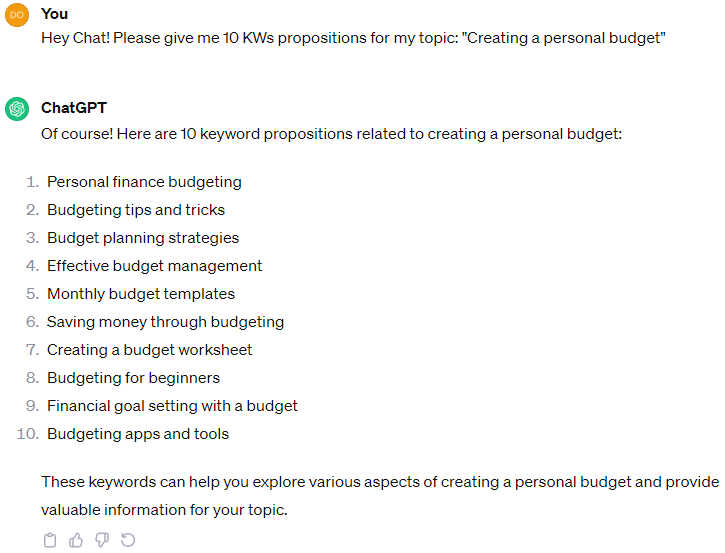
Chat GPT keyword ideas.
GPT generated 10 ready-made proposals. Now, enter the selected phrases in Ubersuggest.
As you can see, the first keyword, “Personal finance budgeting,” has 320 monthly volumes. Below, you can choose other relevant keywords (including long-tail SEO).
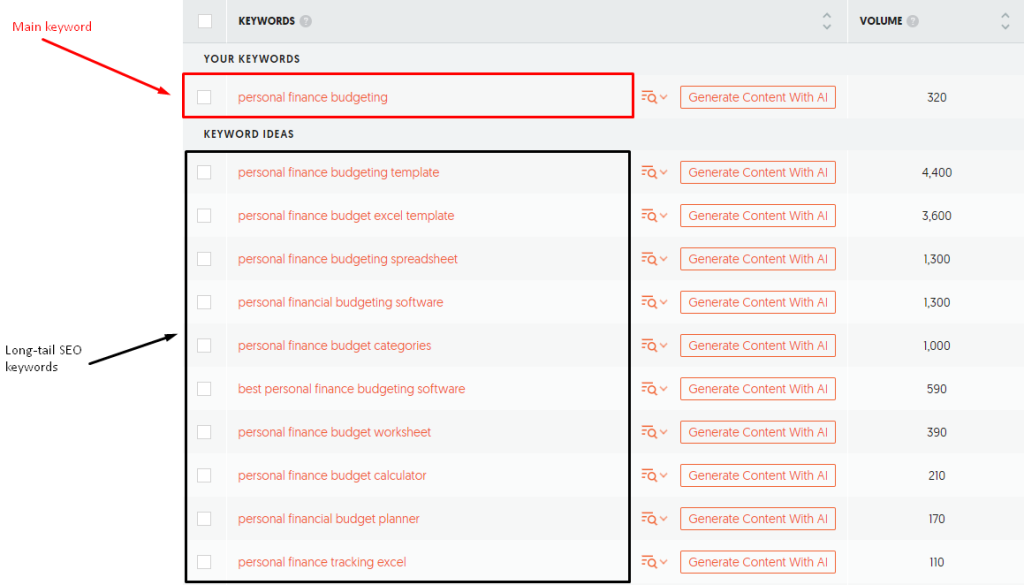
Keywords suitable for your topic.
To see related keywords, click “Related.” We also recommend checking the “Questions” section to create a comprehensive article brief with phrases that users actually search for.
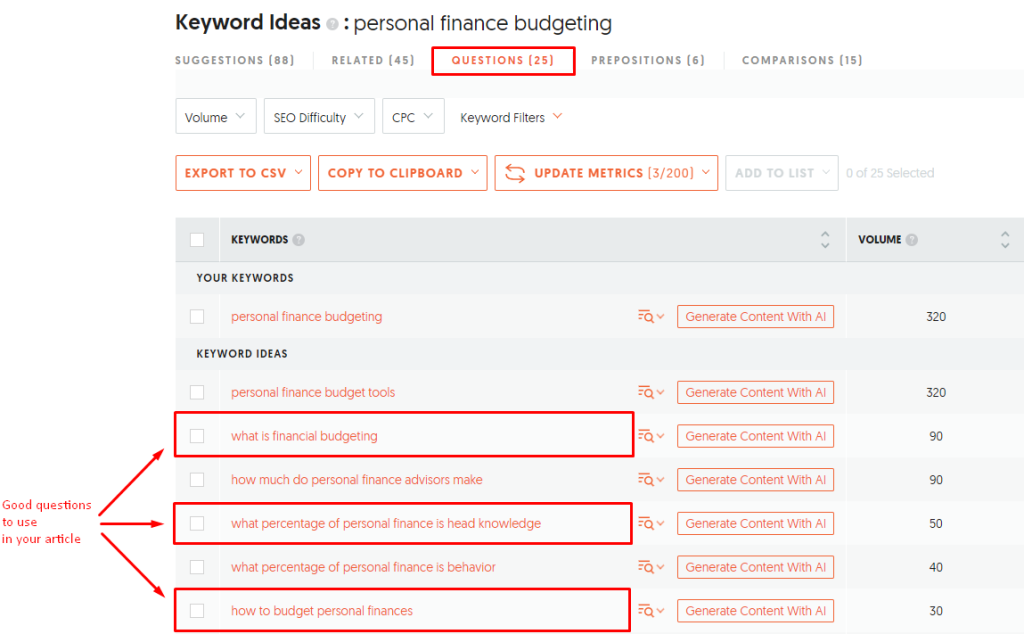
Good questions to use in your article.
Now, you’re able to choose relevant keywords fitted to your niche. In the next step, you’ll learn about organizing everything.
Prepare thoughtful topic clusters
Topic clusters are a concept that revolves around creating a network of interconnected content pieces around a central topic, known as pillar content.
For example: “How to become a freelancer” can be your pillar content in the form of an in-depth guide.
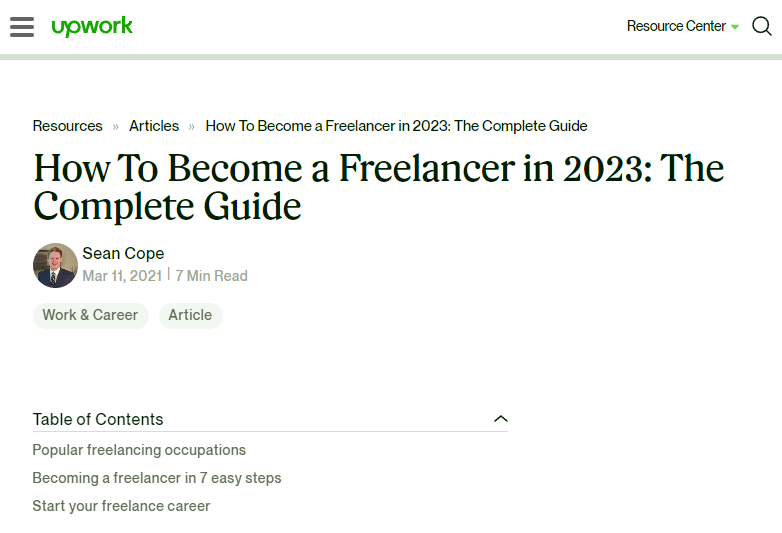
Pillar content’s example.
Then, create at least a few “helpful” articles called cluster content, a.o:
- 20+ best work from home careers in 2023,
- 7 tips to help you succeed as a freelance professional,
- How to get more jobs on Upwork in 2023,
- How to set your freelance rate?
- TOP 10 tools for freelancers.
With the cluster content, you’ll be able to boost your website’s internal linking structure. That helps users to navigate and get trust from Google’s POV.
The more content you produce in your niche, the faster you grind your topical authority level.
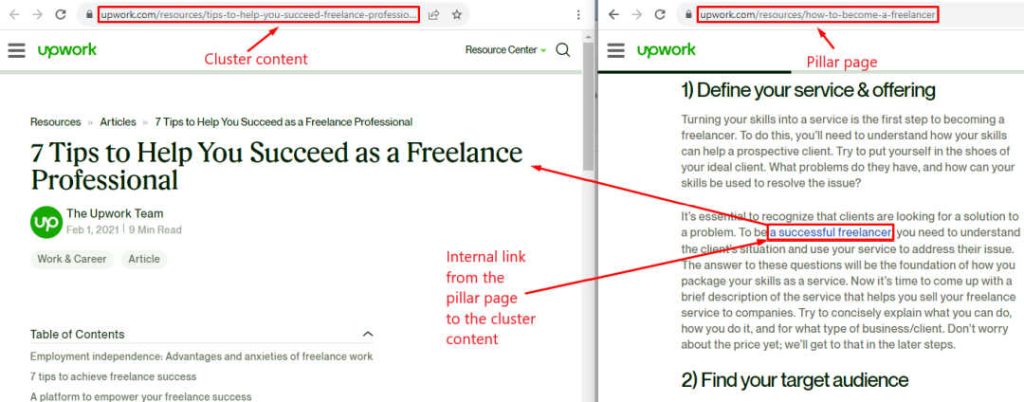
Pillar page and cluster content – internal linking.
Start writing high-quality content with Google’s standards
At this point, pay attention to the following:
Choose the correct type of content for search intent
To ensure the search intent, go to Google and enter your potential keyword. If your keyword is “Calculate BMI,” most search results refer to BMI calculators, not to “How-to Guides”.
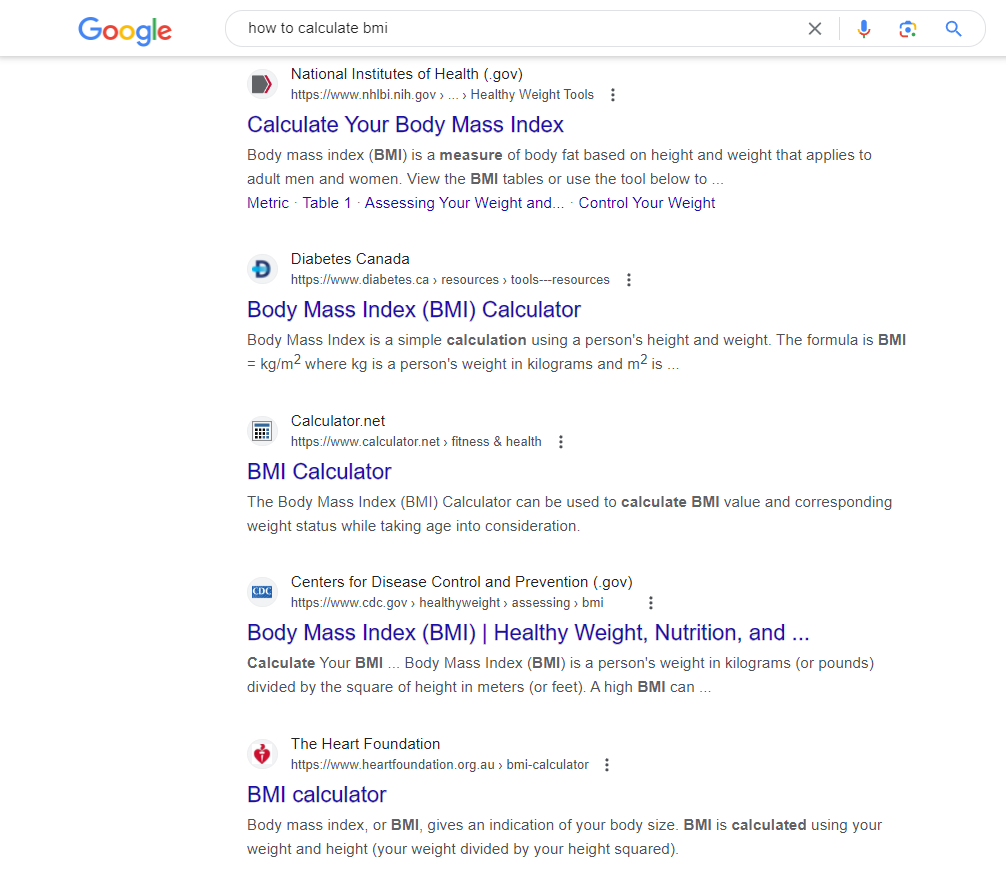
Search Engine Results Page for “Calculate BMI.”
When you create a comprehensive guide, Google won’t rank your article because it doesn’t meet search intent.
The situation differs when considering the “What is BMI?” topic. As you can see, SERPs show only informational intent content, like “What is X, and How to calculate X.”
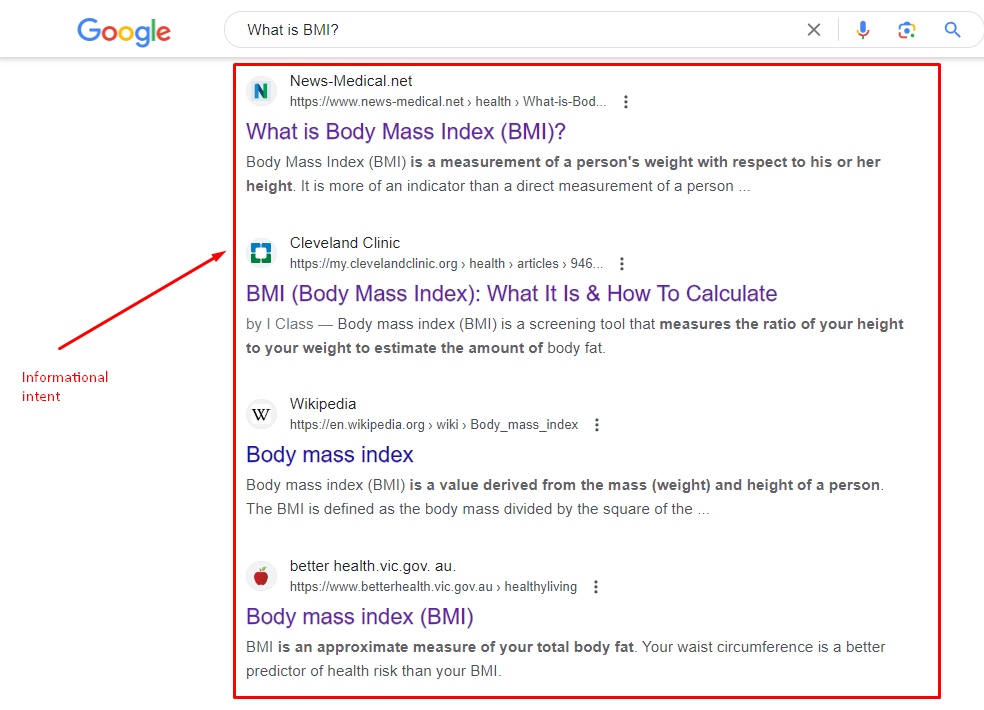
SERPs for “What is BMI?”
Calculators can be useful in that case, but informational intent content looks like a better idea (it should be your primary goal).
Here are the search intent types:
- Informational – This intent involves searching for information on a particular topic, answering a question, or learning something new (e.g., “What is the capital of France?” or “How to bake a chocolate cake?”);
- Navigational – Users with navigational intent are trying to locate a specific website or page. They already have a destination in mind (e.g., “EverEffect contact” or “YouTube trending videos”);
- Commercial – Searches with commercial intent are made by users who are considering a purchase and want to investigate their options or learn more about a product (e.g., Top-rated laptops for gaming” or “Best smartphones 2023”);
- Transactional – This intent is when the searcher wants to complete a specific action, usually related to online shopping, signing up for a service, or any other transaction (e.g., “NY flight tickets” or “Nike running shoes”).
Create content with Google E-E-A-T standards
E-E-A-T is especially vital in the YMYL (Your Money or Your Life) sector, covering health, finance, happiness, or safety.
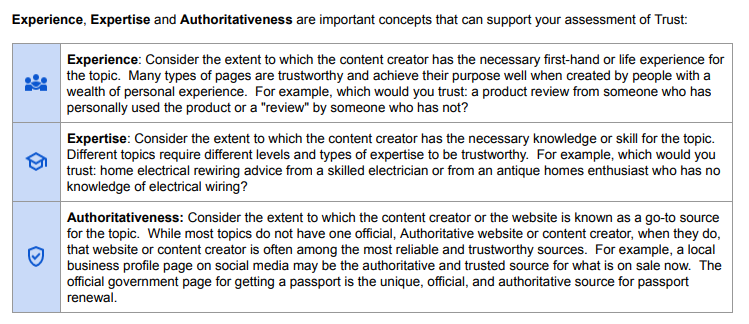
E-E-A-T – Search Quality Rater Guidelines. Source: static.googleusercontent.com/media/guidelines.raterhub.com/en//searchqualityevaluatorguidelines.pdf
In a nutshell – if you’re writing about any topic, you should be an expert (E) with experience (E). Content format must also provide authoritativeness (A) and trustworthiness (T).
How to do it? Add sources to your content from trusted websites, and make your content valuable enough to be a source, too!
Complicated? Check out our article: What is Google E-E-A-T, and how can you optimize for it?
Write well-SEO-optimized articles using Surfer SEO
You’ve probably heard about content editors like Surfer SEO. These are tools navigate you about many essential SEO things a.o.:
- How long should your article be?
- What keywords do you need to use?
- How many specific keywords should you implement in article structure and headlines?
- What’s your content overall score compared to the TOP 10 SERP competitors?
You can rank higher with a sufficiently valuable domain if you achieve a higher content score than competitors.
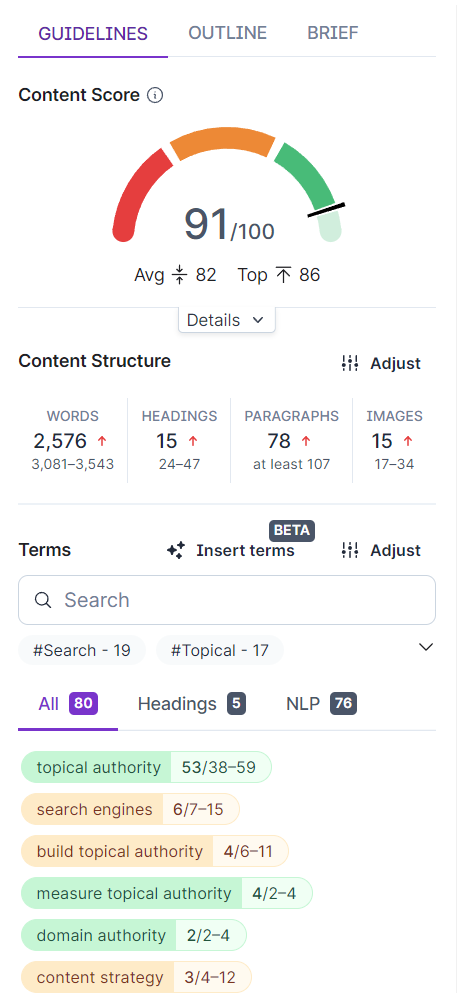
Content score our article about Topical Authority.
Use Grammarly and Hemingway Editor to correct grammar and style issues
You can write substantive content, but your efforts will be wasted if you don’t care for grammar and style correctness.
Fix all mistakes with Grammarly, then check your article in Hemingway Editor to fine-tune the style and length of sentences. You’ll thank yourself for this!
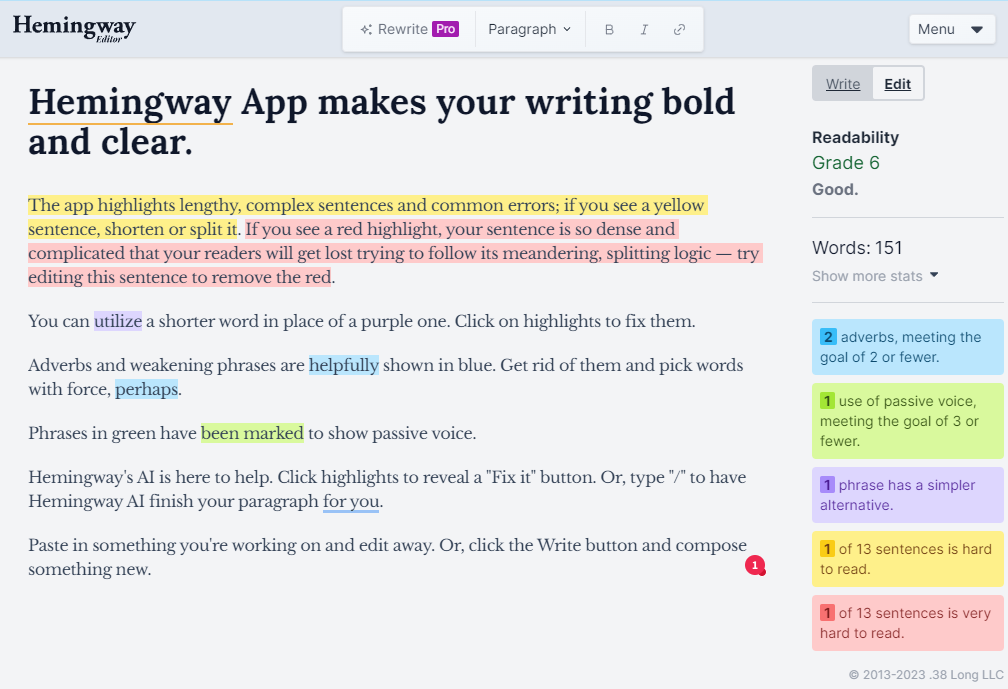
Hemingway app. Source: www.hemingwayapp.com
Get natural and relevant backlinks from authoritativeness websites
Link building – the icing on the cake and the complete basis. To achieve a high topical authority level, you must get backlinks. Three elementary ways:
- viral content,
- guest posting,
- infographics.
Aim for quality backlinks, not quantity. If you have many links from low-authority websites extended beyond your industry, delete them in Google Search Console!
To check your link profile, use Ahrefs DR Checker. The more DR, the higher the topical authority level your website has. That’s the first way to measure topical authority.

Ahrefs DR Checker. Source: www.ahrefs.com/website-authority-checker
How to Measure Topical Authority in Google Analytics 4?
DR checking is an excellent method to measure topical authority. But if you want to confirm your efforts with another tool, choose Google Analytics 4 (GA4).
Firstly, go to Reports.
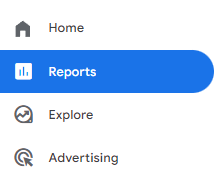
GA4 reports.
Then, choose Life cycle → Acquisition → Traffic acquisition.
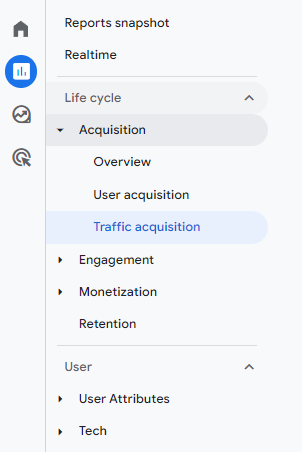
GA4 acquisition menu.
What’s next? Filter the data by your campaign sources. For example, check Organic Search if you use blog articles to build brand trust and engagement.
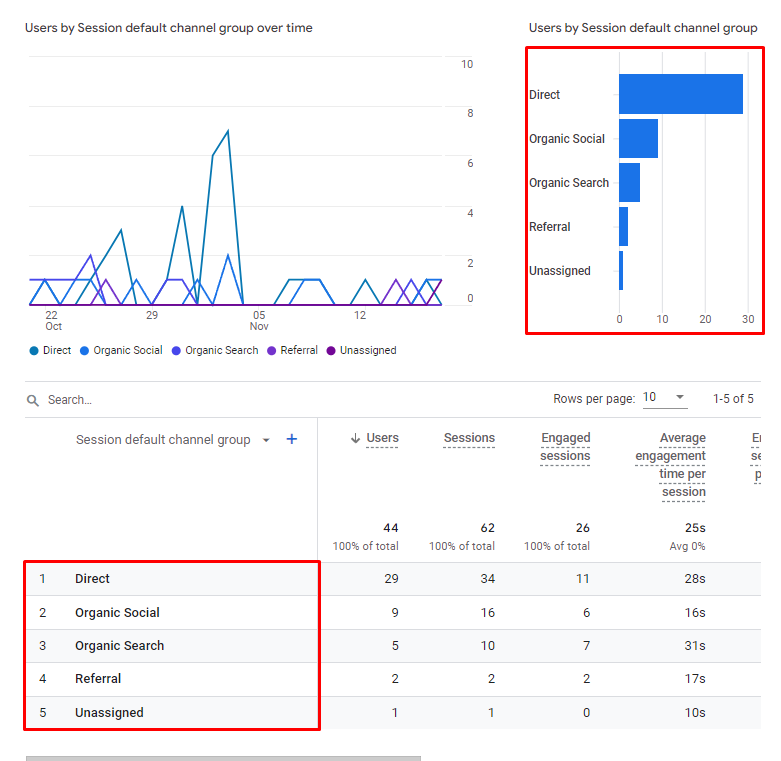
GA4 traffic acquisition results.
Topical Authority – SEO Importance [The Whole Truth]
When creating content with topical authority rules, your site becomes an SEO-friendly machine that helps you get:
- Higher SERPs ranking – By focusing on building topical authority, you make your website a go-to resource for a particular subject. This involves comprehensively creating in-depth content covering a broad topic, using semantically related topics and seed keywords based on keyword research tools. When you provide valuable content that thoroughly addresses a user’s search query, Google and other search engines recognize your site as an authoritative source. This recognition leads to higher rankings on search engine results pages (SERPs), as search engines aim to match search intent with the most relevant and authoritative websites.
- More organic traffic – Establishing topical authority means your content is topically relevant and effectively addresses user intent. As your site ranks higher for related search queries, it naturally attracts more organic traffic. This is achieved by grouping relevant content into content clusters, using semantic search principles, and ensuring your content marketing strategy aligns with users’ search. The more your content aligns with these search queries, the more likely users find your site as a valuable resource.
- Additional conversions – When your site becomes a recognized authority on a subject matter, users are more likely to trust your content and take desired actions, leading to higher conversion rates. This trust is built by consistently providing comprehensive content that answers search queries fully, demonstrates expertise, and offers relevant links and resources. Achieving topical authority thus not only drives traffic but also encourages users to engage more deeply with your site, whether it’s signing up for a newsletter, making a purchase, or exploring further content.
- Lower bounce rate – A lower bounce rate is a natural consequence of building topical authority. As users find your content highly relevant and valuable, they’re more likely to explore other pages and resources on your site. This is enhanced by a well-thought-out content marketing strategy that interlinks related topics, creating a network of information users can navigate easily. By satisfying user searches with in-depth, authoritative content, you ensure that visitors remain engaged, reducing the likelihood of them ‘bouncing’ away quickly.
Summary
Without consciously building topical authority, you’ll drift in search engines’ oceans and won’t mean much (at best, your website will be mediocre). To outdo your competitors, you need to set ambitious goals. One of them is to build an influential authority in your favorite niche (e.g., in finance, crypto, or beauty).
It’s a lot of work, but that’s the only way customers can trust your company and see your products and services’ value. Google will also appreciate your efforts. If the content you create is qualitative and substantive, consistent with the latest search engine standards, Google robots will index your website faster and rank it higher than before. Why? Because they’ll see that what you publish is valuable and improve our online world.
We can help you get more organic traffic by skyrocketing your topical authority level. Get your free proposal by filling out the form or contact us at 888-506-2183.
Topical Authority – FAQs
What are the most common questions and answers about Topical Authority?
- What is a Topical Authority Map?
A topical authority map is a strategic framework used in content strategy. It involves organizing your content around a seed keyword and related topics based on keyword research. This map helps you identify gaps in your content and opportunities for expanding your topical relevance. You can establish topical authority more effectively by meticulously planning your content around a central theme and its facets.
- Can I Rank High in SERPs Without Topical Authority?
While ranking high in SERPs without established topical authority is possible, it’s increasingly challenging. Search engine optimization (SEO) strategies emphasizing topical relevance are becoming vital. Without demonstrating authority on a topic, you risk being overshadowed by competitors who have invested in creating authoritative content in your industry.
- Why is Topical Authority Important?
Topical authority is significant because it signals to search engines, like Google, that your content is relevant but also comprehensive and trustworthy. This importance is reflected in search engine algorithms, prioritizing content that thoroughly covers a topic. Establishing topical authority helps achieve higher search rankings and attract more organic traffic.
- Is Topical Authority Important in SEO?
Absolutely, topical authority is a cornerstone of modern SEO strategies. It goes beyond traditional keyword optimization, requiring a more holistic approach to content creation. By focusing on a content strategy that builds topical relevance, your website gains credibility in the eyes of search engines, which is crucial for long-term SEO success.
- What Industries Should Take Care of Topical Authority?
All industries benefit from establishing topical authority. However, it’s crucial for sectors where experience, expertise, authoritativeness, and trustworthiness (E-E-A-T) are significant, such as healthcare, finance, and education. In these industries, demonstrating in-depth knowledge and reliability through your content is essential for gaining user trust and search engine visibility.
- What’s the Difference Between Topical Authority and Domain Authority?
Topical authority focuses on your website’s expertise in a specific subject area. In contrast, domain authority is a broader metric that assesses your website’s overall strength and credibility, often influenced by inbound links and other factors. While both are important, topical authority is more content-centric, emphasizing the quality and relevance of your information in a particular field.
- How Long Do I Need to Build an Authoritative Website?
Building an authoritative website takes time and depends on various factors, including your industry’s competitiveness and content quality. A well-planned content strategy, based on thorough keyword research and regular publication of relevant, high-quality content, can expedite this process. However, establishing proper authority often requires consistent effort over several months to years.

